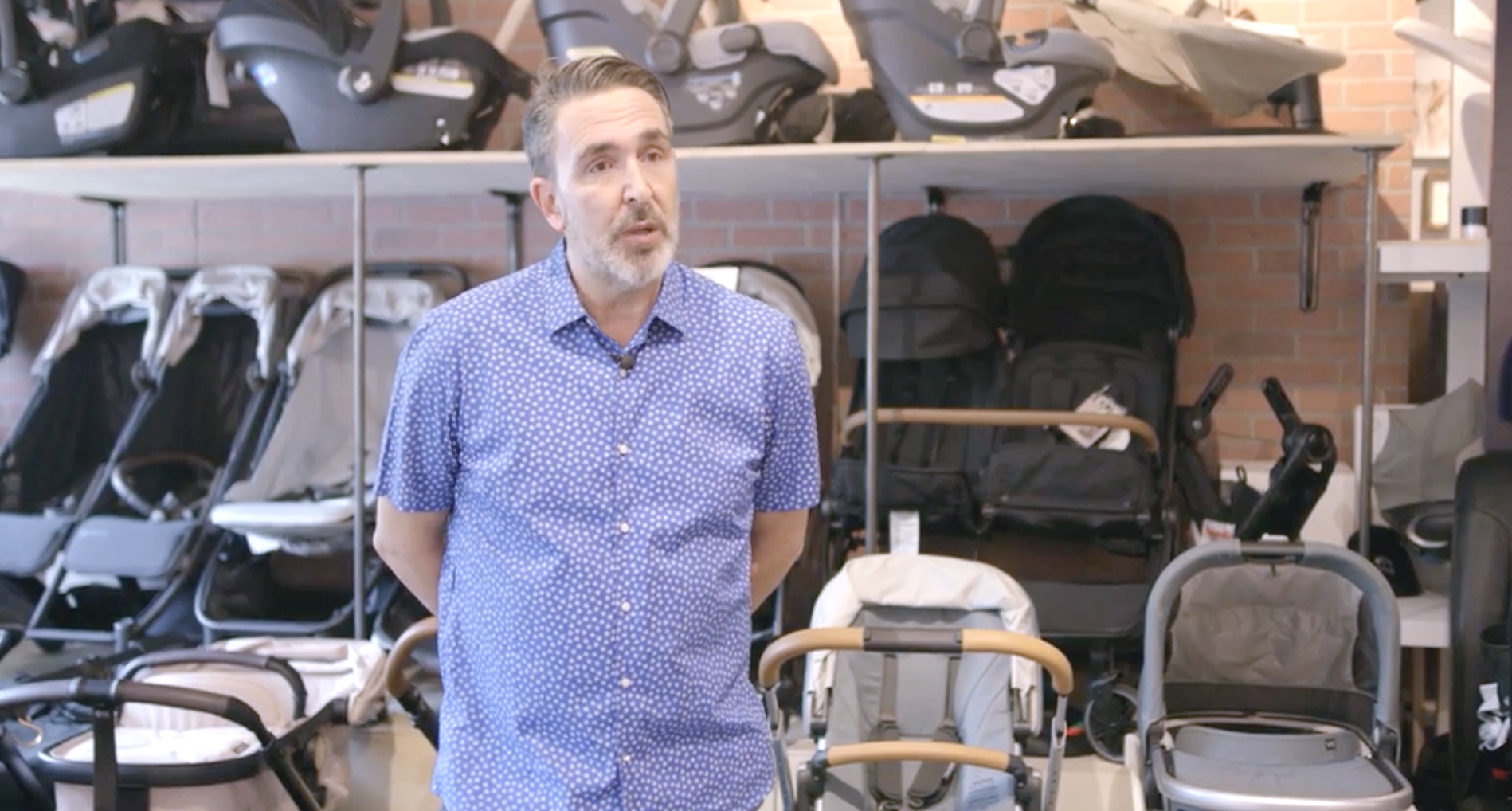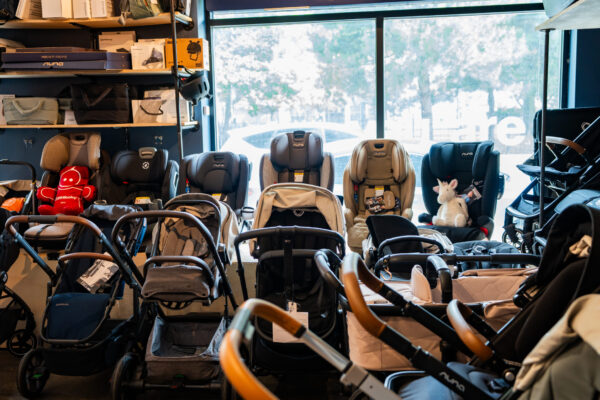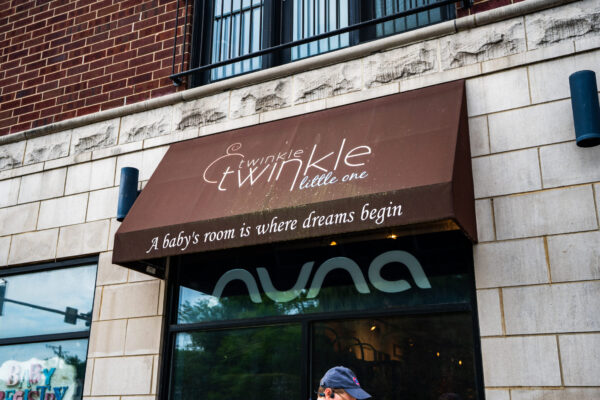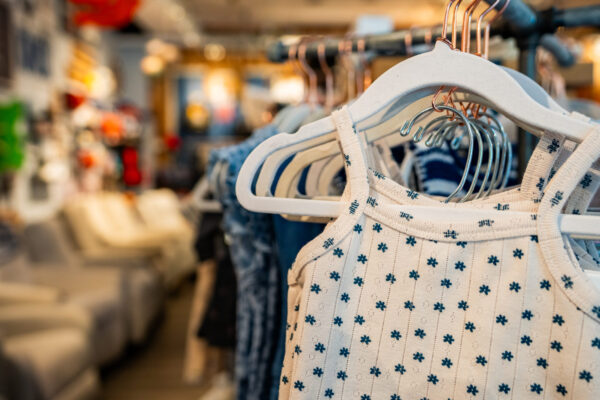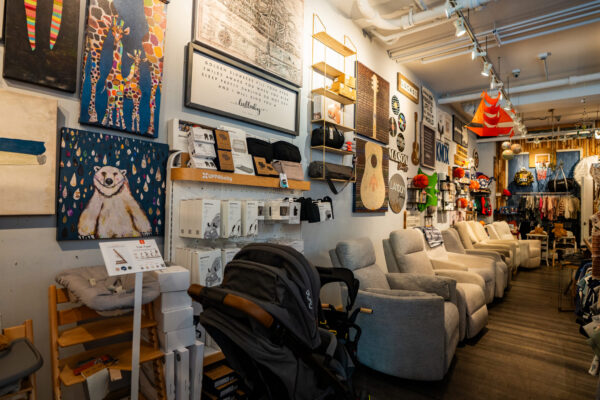I am text block. Click edit button to change this text. Lorem ipsum dolor sit amet, consectetur adipiscing elit. Ut elit tellus, luctus nec ullamcorper mattis, pulvinar dapibus leo.
The indiscriminate tug of the tariff turf war smacks with irony at Twinkle Twinkle Little One in Chicago’s Roscoe Village neighborhood. What should be a peaceful haven for expectant and new parents wanting car seats, strollers, gliders, cribs, dressers, clothing is rippling from the rocky ramifications of America’s global trade war.
Many of the items sold at this brick-and-mortar store of 18 years are manufactured in China, and so, like other infant stores nationwide, owners Rachel and Corey Glasson face price hikes for purchases of merchandise and a backlog of available inventory. It is a daunting dilemma that Corey spent time recently discussing with IRMA.
IRMA: Have you begun to feel the impact of new tariffs?
COREY: It all really started occurring in early April 2025. We felt not only the impact on prices, for instance on car seats and strollers, but also in the supply chain and keeping them in stock. Those are the big two things that we’re focusing on in terms of mitigating the impact as best as we can with our customers.
IRMA: OK, let’s talk about the pricing. What changed in April?
COREY: Well, in April there was a whole lot of chaos. All the brands, not just some, but all the brands, even before they knew exactly what was going on, immediately raised their prices because they knew what was ahead. Then some brands raised their prices again and then again. That was all based on all sorts of news that was coming out from the federal government about tariffs will go from X to Y, and then again, even higher.
IRMA: What has happened since then?
COREY: It has settled down a little bit, but the prices remain the same. The 35% tariff on most products coming out of China is still too high for these brands to be manufacturing and shipping large quantities to the United States. So, we’re having issues obviously, with price, but also the supply chain where these products are sitting on a boat waiting to ship. But it’s not going to come over anytime soon until this gets addressed.
IRMA: So, what are you doing now to react to all this?
COREY: I think from our experience from COVID, we knew that there was going to be some supply chain issues under these circumstances. So, we got ahead of it and made an investment in basically a department store’s worth of inventory. It was an uncomfortable amount for us, but we purchased stock we know will sell with our customers. We also purchased some large volume space and have multiple warehouses around Chicago to store that stuff, which is an additional expense.
IRMA: Do you envision that your inventory is going to run dry?
COREY: We worry about that very much. For example, there is one particular brand of car seat that we sell, and every morning there are four or five orders. But I’ll need to cancel those orders, because I only have a limited amount of stock. I’m very mindful of our local customer experience, and I need that stock for them, so they’ll go out and tell their friends and family and other people about our store.
IRMA: We are experiencing the first wave of tariffs. What’s going to happen if tariff rates go up again?
COREY: I suspect what’s going to happen is that many brands are not going to be shipping their products into the United States. We are already seeing some of that. If we get to 100%, 150% tariffs, we can just forget about any of these coming in any time soon, other than the stock that I have, or the stock that the vendor already has in the United States. That’s why we’ve stocked as much as we can store in order to mitigate things for as long as we possibly can.
IRMA: What do you say to customers who are already worried about prices or waffling about buying something that they know they’ll need for sure?
COREY: Traditionally, the way that we’ve operated our business is to not be pressure sellers. We feel like we earn your business by educating, by offering installation, and all the sort of things that a first-time parent would want. With that, we encourage parents, just based on our supply and the supply chain, and so they don’t have to buy it today. You can buy it a month from now or two months from now. We’ll just recommend that we do an install on a piece of furniture or a crib 30 days before the baby’s due. But, that has changed obviously, and the messaging has changed to our customers. Basically, today the item is actually here and at one price. But we don’t know about six months from now. We know we have the item today. But we can’t say that that’s going to cost the same or even be in stock in six months. So, in order to ease minds and stress, we recommend our customers make purchases sooner rather than later.
IRMA: Why is choice of a car seat so critical for new families?
COREY: A car seat is all about safety. The one thing that we preach to customers is that choice of car seats has nothing to do with driving sales to our business. You should not buy a used car seat. If a used car seat has been in an accident and you’re not aware of it, that’s something that you should throw away. There’s a certain set of customers where new products may be out of reach, and being able to afford these products is difficult. That will encourage those people to go on Facebook Marketplace or random websites and buy something used that isn’t necessarily safe. So that’s our biggest concern for our customers. We believe being able to sell new and safe car seats is essential.
IRMA: What makes tariffs on car seats so worrisome for you?
COREY: While we’ve made a large investment in inventory to mitigate any issues that we’d have as a business, there’s only so much that we can invest in, and there’s only so far that we can see ahead. We have a lot of uncertainty and we worry how that affects our business. I know we need to have access to particular brands of car seats or certain strollers which are the items that drive people into our stores on the weekends and during the week and drive the revenue for our store. Without them we don’t have a store.
IRMA: So, what is the message you want politicians in Washington to understand about your business?
COREY: My message to Washington is you have to get your act together, and you have got to work together to figure this out, because this is not sustainable for a small retail business in the United States. At 35%, at 20%, it is just not going to be conducive for a business like ours. Also, it’s not just our business being impacted by this. Remember, first-time parents who are just establishing their lives with the first baby are spending 30–40% more on car seats and strollers than they were before.
To learn more about Twinkle Twinkle Little One, visit www.twinkletwinklelittleone.com.
